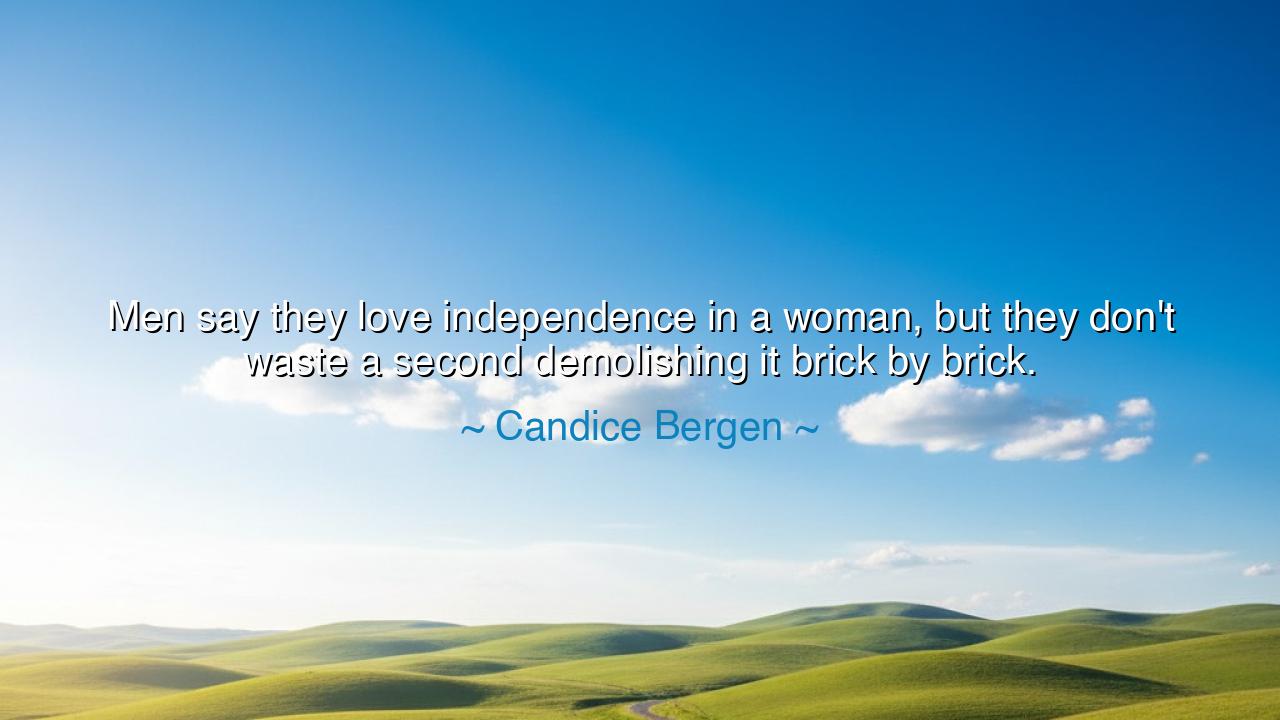
Men say they love independence in a woman, but they don't waste a
Men say they love independence in a woman, but they don't waste a second demolishing it brick by brick.






Listen, O children of the future, to the words of Candice Bergen, who speaks a truth known to women through the ages: "Men say they love independence in a woman, but they don't waste a second demolishing it brick by brick." These words are filled with both sorrow and insight, for they reveal a deep, painful irony about the relationship between freedom and love, and the struggle that many women face when they dare to stand on their own. Independence, as Bergen speaks of it, is a delicate construct—a thing often admired in theory, but so often eroded in practice by those who claim to love it.
What is the meaning of independence, O children? It is not merely the freedom to make one's own choices, but the power to chart one’s own course, to live without the shadow of another’s control. It is the right to stand firm, to build, to dream, and to achieve without needing the approval or validation of others. Candice Bergen’s words reflect a painful truth: independence is something that many men claim to admire in women, yet often do not fully understand, let alone support. For in reality, many seek to undermine it, whether through societal pressures, romantic relationships, or subtle forms of control. Independence in a woman, though praised, is often feared, for it challenges the long-held norms that seek to define women by their roles in relation to others, rather than by their own inherent worth.
Consider, O seekers, the story of Cleopatra, the queen of Egypt. She was a woman who ruled with great independence, forging alliances with the mighty Julius Caesar and later with Mark Antony. Yet, throughout her reign, she was not only admired for her intellect and political savvy but also faced countless attempts to undermine her autonomy. The men who claimed to support her were often the very ones who sought to diminish her independence. Even in love, Cleopatra's alliances were often seen as a means to strengthen her political power, and yet, her independence was always scrutinized, feared, and at times diminished by the very forces she aligned with. The story of Cleopatra is a timeless reminder that the admiration of a woman’s independence is often fleeting in a world that still struggles to accept her autonomy.
The paradox spoken of by Candice Bergen is not a new one. It is as old as the Roman Empire, where women like Livia Drusilla, the wife of Emperor Augustus, wielded incredible political power behind the scenes. Though she was admired for her intelligence and influence, her independence was often a subject of both admiration and scorn. Livia understood the delicate dance of maintaining power while navigating a world that was not ready to see women as independent rulers. Her very strength was often misconstrued as manipulation, and the more independent she became, the more fiercely the men around her sought to undermine that very strength.
This contradiction is not confined to the distant past. Modern women—those who strive to build careers, to make their own choices, to lead—often find themselves in similar struggles. They are told that they should be strong, yet those very qualities of independence are often seen as threatening. Men may claim to admire strong women, but the moment a woman steps too far outside the bounds of what society expects—when she refuses to defer, when she dares to lead, when she insists on her own voice—there are those who will seek to bring her down, to chip away at her independence bit by bit. The irony of this world, O children, is that the very strength that is celebrated in theory is often the target of the weakness of those too afraid to embrace true equality.
Therefore, O children, what is the lesson in this sorrowful paradox? The lesson is clear: independence, particularly in women, is not easily won or easily maintained. It is a precious gift, one that must be guarded and nurtured with great care. In this world, where love and admiration are sometimes used as tools to control, it is vital to recognize that freedom and independence are not things that are granted by others—they are things that must be claimed by each individual. Women must learn to stand firm, to define themselves not by the expectations of others, but by their own dreams, their own choices, and their own purpose.
Let this be the wisdom passed down through the ages: To be independent is not to reject love or connection, but to stand firm in one’s truth while still honoring the connections we forge with others. It is to love and be loved, but to never lose sight of one’s own power and self-worth. To those who seek independence, remember this: the world may challenge you, and there may be those who try to chip away at your freedom, but your independence is yours to keep. Stand firm in it, protect it fiercely, and above all, celebrate the beauty of living life on your own terms. Let no one, man or society, ever convince you that your freedom is something to be sacrificed.






AAdministratorAdministrator
Welcome, honored guests. Please leave a comment, we will respond soon